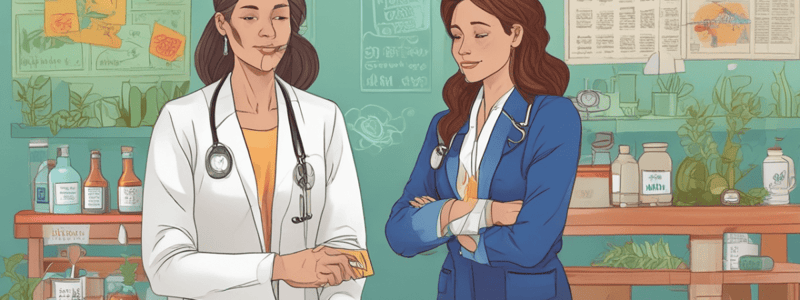Podcast
Questions and Answers
What should you do after studying information?
What should you do after studying information?
- Communicate information to others (correct)
- Only explain to yourself
- Use biased sources
- Ignore the credibility of sources
Which of the following tasks helps in accessing accurate health information?
Which of the following tasks helps in accessing accurate health information?
- Ignoring the evaluation of sources
- Using a variety of search terms and phrases (correct)
- Relying solely on one resource
- Using a single search term
What should you do to ensure the credibility of the information you found?
What should you do to ensure the credibility of the information you found?
- Evaluate sourcing (correct)
- Ignore bias in sources
- Avoid reviewing different resources
- Only consider one website
Which sources might suggest a bias?
Which sources might suggest a bias?
What is a healthy decision you could consider in the first scenario provided?
What is a healthy decision you could consider in the first scenario provided?
What is one way to outline a conversation about a party?
What is one way to outline a conversation about a party?
What step should be taken before making an assessment of the information you found?
What step should be taken before making an assessment of the information you found?
Which action is recommended for promoting health literacy in schools?
Which action is recommended for promoting health literacy in schools?
Which method might help exclude yourself from an uncomfortable situation?
Which method might help exclude yourself from an uncomfortable situation?
What types of sources are helpful to review when gathering health information?
What types of sources are helpful to review when gathering health information?
Flashcards are hidden until you start studying
Study Notes
Health and Wellness Skills
- Evaluate your current health and wellness skills using a scale of 1-5 to rate your comfort level with skills such as making decisions, setting goals, evaluating health information, and advocating for community and public health.
Making Decisions and Setting Goals
- The decision-making process consists of six steps:
- Define the decision or problem
- Explore alternatives and options
- Consider the consequences
- Identify the best alternative
- Decide and act
- Evaluate and revise
- Developing a plan to achieve short- and long-term SMART goals is essential for making healthy lifestyle choices.
- Making healthy decisions involves considering the consequences of each alternative, evaluating the pros and cons, and selecting the best option that aligns with your values and goals.
Evaluating and Revising Decisions
- Factors to consider when evaluating a decision:
- Obstacles faced in acting on the decision
- Support needed to commit to the decision
- Whether the decision solved or helped with the problem
- Commitment to the decision for a longer time
- Evaluate a decision's effectiveness and revise the plan as needed.
Using Health Information
- To make informed decisions, it's essential to evaluate the credibility of health information sources.
- Skills for finding reliable health information include:
- Accessing information from credible sources
- Reviewing and evaluating different resources
- Assessing the credibility of sources
- Communicating information to others effectively
Advocating for Community and Public Health
- Participating in community service and accessing community resources helps promote health and wellness in the community.
- Building an information-rich school environment that provides credible health and wellness information is essential for promoting literacy and healthy lifestyle choices.
Studying That Suits You
Use AI to generate personalized quizzes and flashcards to suit your learning preferences.




